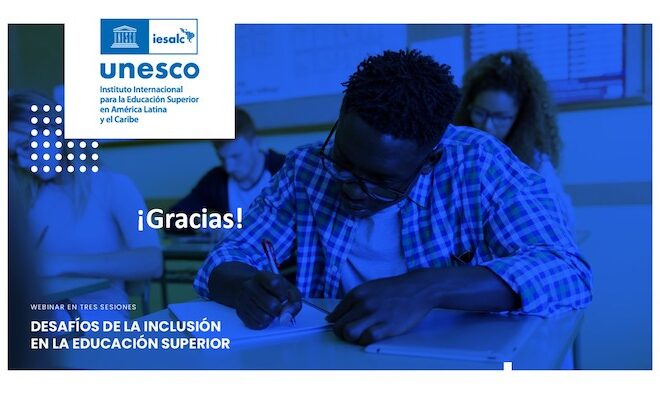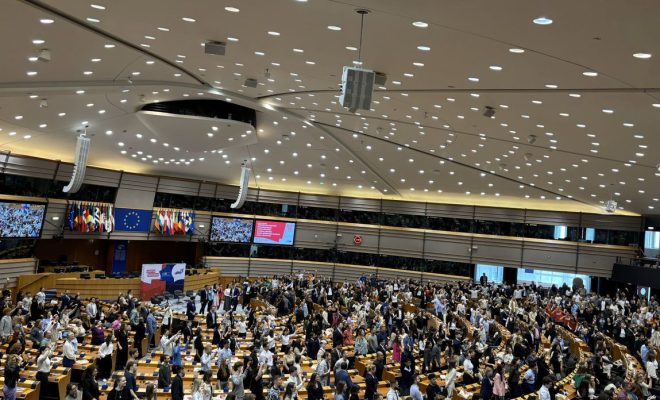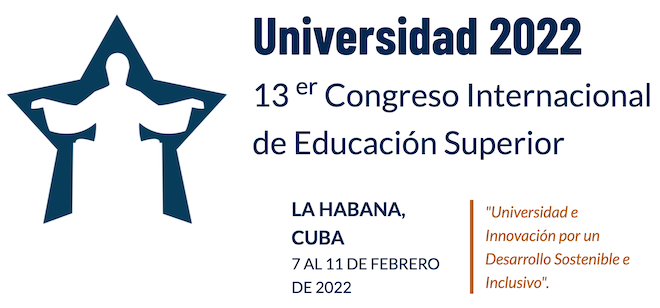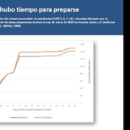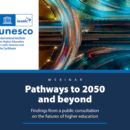Day 3 – Members of the Governing Council addressed the challenges facing higher education in the region in the globalized world
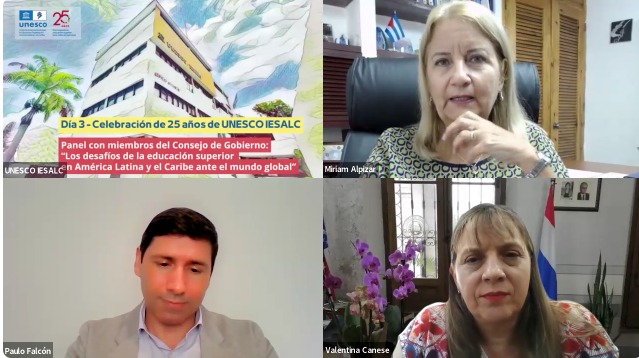
On the third day of the anniversary week, members of our Governing Council discussed in an online seminar the challenges facing higher education in Latin America and the Caribbean in the face of a globalized world.
The panel included Paulo Falcón (Argentina), former National Director of University Management of the Ministry of Education of Argentina; Valentina Canese Caballero (Paraguay), Director of the Higher Institute of Languages of the Faculty of Philosophy of the National University of Asunción; and Miriam Alpízar, Head of the Secretariat of the Minister of Higher Education (Cuba), who also served as moderator.
The members of the Governing Council discussed the main transformations that higher education has undergone in the last 25 years, the challenges it faces and also the contributions made by UNESCO IESALC.
Alpízar highlighted the work of UNESCO IESALC throughout its trajectory and covering fundamental issues of higher education, accompanying and promoting to face the fundamental challenges and achieve the transformation of the region.
He explained how Cuba has bet on the growth of enrollment, the accreditation system of institutions and doctoral training for the development of science, technology and innovation.
Canese reviewed the progress made in higher education in Paraguay after the fall of the dictatorship in 1989 and the creation of a new legal framework in the democratic era. There are currently 10 public universities, more than 50 private institutions, the National Institute of Higher Education, regulatory legal frameworks and the National Council of Science and Technology for the development of research projects.
These advances, which are repeated throughout the region, have led to higher enrollments, number of graduates, teacher training institutes, and accreditation models. However, there are still challenges for higher education institutions in promoting innovation and the creation of new knowledge.
As for the challenges, Canese considers necessary the creation and strengthening of academic networks, as well as quality and relevance, and equity and inclusion to guarantee higher education as a public good and a right for all people in a particularly unequal region, as well as the need for resources to promote internationalization and the exchange of knowledge.
“In our countries, I believe we have to strengthen the idea of equity and inclusion of higher education as a public good, through citizenship, showing decision-makers the importance of investing in higher education”.
For his part, Falcón highlighted the work of UNESCO IESALC in consolidating the relevance of higher education in the 33 countries that make up the region. He highlighted the role of Latin America in the First World Conference on Higher Education in promoting the perspective of higher education as a human right, as a public good and a responsibility of the States.
“Higher education in particular has had the opportunity to reposition itself within the public agenda in a leading role. The fact that the United Nations in 2015 approved the Declaration Transforming our World, which incorporates within the 2030 Agenda the Sustainable Development Goal number four, which states very clearly that education in the face of 2030 has to be inclusive, equitable, of quality, that guarantees lifelong learning opportunities and that it is for the whole society.”
He commented that due to demographic issues, higher education and professional education, education for work are the educational levels that are called to grow continuously and permanently, so that education systems and institutions will have to face challenges in terms of expansion and growth.
This forces us to rethink the terms of expansion policies and of governance and autonomy:
“Today there are much more intelligent ways of attacking autonomy, no longer with clumsy ways of persecution, closure of institutions and so on, but there are also countries where budgetary aspects are a way to condemn, to persecute, to limit the power that the university and its communities have in relation to the exercise of critical thinking.”
In addition to budgets, there is a need for intelligent execution and transparent accountability policies, exercising public exemplarity in a region where the scourge of corruption is something that crosses practically all States and governments.
He also stressed the need for significant pedagogical and didactic changes to adapt to a new generation of students and, at the same time, the integration and development of the region through tangible agreements.
“Higher education is relevant when it is socially relevant and so here we also have the obligation to work cooperatively to give each other a hand, to help each other, to make better education among all, so that the experience of other systems can be an experience that can be shared and that in this sharing we all grow in a serious, responsible and especially supportive way.”
Alpízar agrees that regional integration continues to be a pending issue because we do not have a unique and stable system, which can promote the tools and knowledge that the university has for territorial development; at the same time he highlighted the role of young people in transformation and innovation.
“Budgets are the reflection of how the state or governments support the operation of universities for the fulfillment of their mission. But it is not enough for the budget to be bigger, but how to use it better, how to be identified by projects, by results. So that it is transparent, accountable not only to the government, to the State that allocates the resources through reports and balance sheets, but also accountable to society in a public way, in the media, in the press, in the networks”, said Alpízar.
Likewise, the panelists highlighted the need for technological transformation, whose vertiginousness also forces the adaptation of plans, programs and teaching and education methods.
They suggested that UNESCO IESALC could generate spaces for direct cooperation to promote integration, not only among institutions of higher education, but also through governmental actors under a public agenda linked to the major issues of higher education, which enhances equity, quality, diversity, plurality and success in the completion of studies.
Other videos:
Artistic heritage of UNESCO IESALC
For the UNESCO International Institute for Higher Education in Latin America, artistic and cultural manifestations are not only nourishment for the spirit, but fundamental expressions for the construction of a culture of peace. This video serves as a tribute to the creators who have left their everlasting mark on this institution.
Capacity Building Program
Yuma Inzoila, Director of Capacity Building, shows how this area has had an impact on different higher education institutions and public agencies, through training actions and technical assistance programs, aimed precisely at strengthening competencies through a training offer specialized in the needs of the region.
Young People on Transforming Education Project
Bosen Lily Liu, head of the Young People on Transforming Education Project, launched jointly by UNESCO IESALC and UNESCO ICUA, seeks to elevate education and meaningful participation in decision-making as a priority issue on the global political agenda to mobilize action, ambition and solidarity in search of solutions.
RELATED ITEMS

